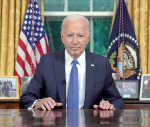You are here
Eastern Europe and the Middle East on edge
Sep 28,2022 - Last updated at Sep 28,2022
November 2022 will be a turning point in the history of the Middle East and North Africa region in particular and the world in general, because we will be witnessing very important legislative elections in Israel and the US. These elections will be in the aftermath of China’s key meeting of the ruling Community Party at which Xi Jinping is slated to win a third term for five years more. The other matter of concern will be oil and gas supply issues and ramifications on Europe this winter.
These four topics are tangled and intertwined organically because they have impact on peace and war, not only in the region, but in the world. The US midterm elections on November 8, 2022 will determine whether President Joe Biden’s administration will win a comfortable majority in both Houses of the Congress as all 435 seats in the House of Representatives and 35 of the 100 seats in the Senate will be contested.
On November 1, legislative elections will be held in Israel to elect the members of the twenty-fifth Knesset. The Israeli elections will determine whether the political elite in Israel are able to overcome the Israeli crisis and generate a more homogeneous and capable government to tackle the challenges of the region.
In November, Europe will enter a very cold winter this year with low reserves of oil and gas due to sanctions on Russia and due to lack of supplies in the world market. On the other hand, China’s key congress of the ruling Communist Party at which leader Xi Jinping is expected to be granted a third five-year term will open on October 16. Such congresses are held every five years and usually bring in a new slate of leaders, particularly on the party’s all-powerful seven-member Politburo Standing Committee.
Last June, Henry Kissinger predicted that big events would be coming to the Middle East and Asia, an indicator to war between Israel and another Middle Eastern country. The Middle East is considered a fertile soil for conflicts and wars. The Middle East is characterised by no fixed physical boundaries. Therefore, controlling the Middle East is an endeavor by key powers for the region’s religious importance, geography, natural resources, and population density.
Whether the United States will return to the agreement on Iran's nuclear programme, or whether the war in Ukraine will escalate and turn into a WWIII, or will it quickly reach the point at which it is necessary to search for a political settlement, or whether Israel will sign an agreement to demarcate the maritime borders with Lebanon, there will be a countdown to inevitable war between Israel and Hizbollah.
At the international level, all indications manifest that the war between Russia on one hand and Ukraine and the NATO on the other is heading towards escalation. Further military operations will be conducive to the ignition of WWIII. Political analysts are divided between those who believe that the region will soon witness a regional peace, those who believe that it will witness a military escalation, those who believe that the explosion has been postponed until after November, and those who believe that war is close and cannot be postponed due to the many players on Middle East chessboard.
Israel is preparing for a major regional war, a great adventure that was postponed 10 years ago due to the lack of an American green light. Most Israeli strategists believe it is an inevitable war to fortify the Israeli presence and hegemony.
There is a huge change in the world order and new powers will appear and others will decline, alliances will change, and the Middle East region is de facto changing. The war in Ukraine and the Russian and American diplomatic activities in the Middle East region demonstrated a number of topics: Energy crisis and the importance of the Middle East in global politics on one hand and the mediation role regional powers are playing between the US and Russia. Some of the Middle Eastern states aim to balance their needs to maintain close to the US but without relinquishing their interests and cooperation with China and Russia.
For the Middle East, competition between world players: The US, Russia and China, is similar to the era of the Cold War. However, the Middle East at present believes in a multipolar international world order. If Iran supports Russia and China, Arabs support the inclination towards a multipolar international world order. This explains why they are diversifying their sources of weapons, mainly from the US, China and Russia.
It is almost likely that we will have very hot winter season in the Middle East due to military skirmishes similar to those win Eastern Europe where regional and international players will play their games on these regional chessboards.












